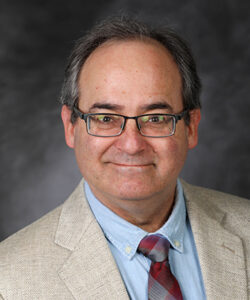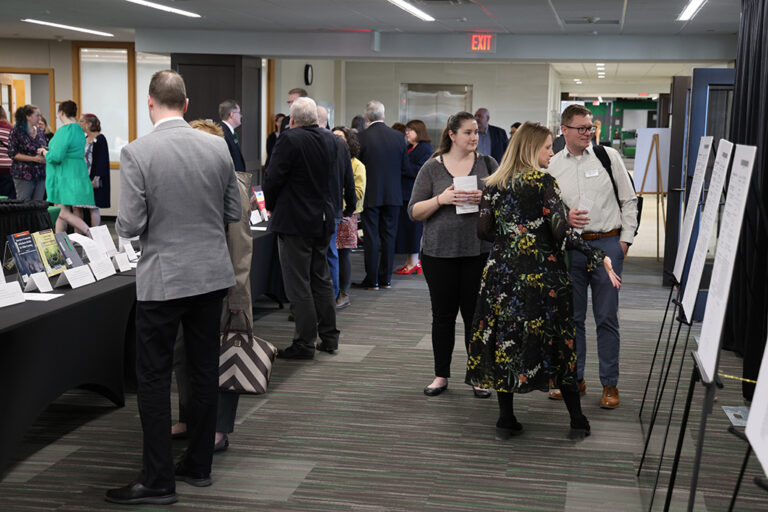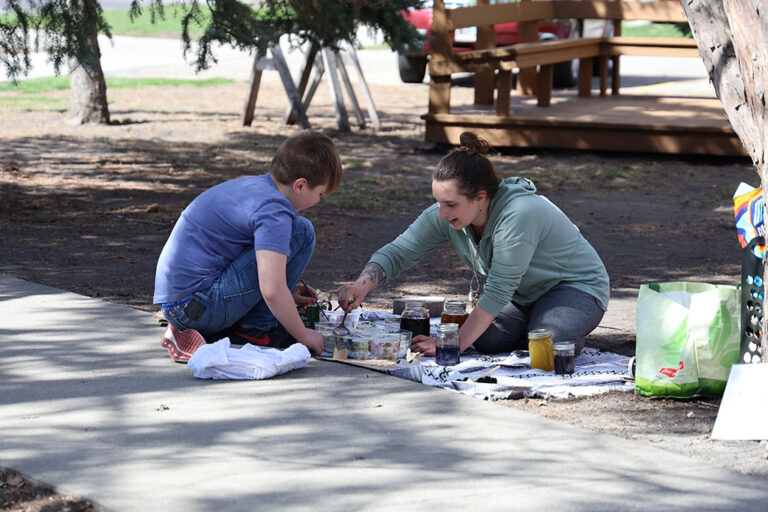Calling audibles
Make leadership calls with ethics and your community’s best interests in mind, says four-time UND grad who leads Grand Forks Public Schools

Understand something, said Terry Brenner, during his talk as part of UND’s 18:83 Speaker Series.
Calling an audible doesn’t always work.
Just ask Terry Brenner.
Brenner is superintendent of the Grand Forks and Grand Forks Air Force Base public schools. In life, calling an audible can refer to making a big decision after weighing the various options; in football, where the term began, it’s the quarterback making a change of play at the line of scrimmage.
As for Brenner, he’s familiar with both versions – especially, he said with a rueful grin, the latter.
While in high school back in Devils Lake, N.D., “I was a 15-year-old quarterback for a pretty good football team,” Brenner recalled. “We were playing one of our big rivals on the two-yard line – their two-yard line. Fourth down.”
The assistant coach called the play. But Quarterback Brenner, once he took his position behind the center, read the defense and shouted an on-the-spot change – an audible.
“I take the snap, turn, fake the hand off, put the ball on my hip – and now I’m gonna run,” he said.
“And I learn what physical inertia is: I run right into the defensive end. We lose the fourth down, we don’t score.”
After that, Brenner could do one of two things, he recounted. “I could have left the field and gone to the locker room; or I could have gone to the sideline to face the person who called the play.”
That would have been the assistant coach: a four-year college starter in football, the co-captain of that college team – and, incidentally, Brenner’s father.
Another audible: Young Brenner turned and walked toward the bench, to face the music from his scowling and steely-eyed but still-loving dad. “He put his arm around me and we talked about it,” he said.

Ethics, morality and consequences
When such decision-points come, make them in line with your ethics and moral compass, plus a solid awareness of how your choice will affect other people, Brenner said. That won’t guarantee a good outcome every time, but it’s the best way of boosting your odds.
UND’s 18:83 Speaker Series hosts talks that take place each Wednesday afternoon at the Memorial Union’s Social Stair. Speakers who’ve taken part have hailed from both on- and off-campus, and they’ve timed their speeches to top out at 18:83.
That’s 18 minutes and 83 seconds, as well as a figure that corresponds with UND’s founding year.
Brenner centered his Jan. 31 talk around that theme of calling audibles, both in life and in the challenging world of today’s K-12 schools. In his case, he said, he’s had some great decision-makers whom he has learned the art from, very much including that unforgettable assistant coach, his father.
When Henry Brenner – Terry’s dad – was six months old, the Rhode Island native contracted spinal meningitis. The illness cost him his hearing, and the boy became profoundly deaf.
“In 1929 – when he was born – and in the 1930s, sign language was forbidden, and schools for the deaf went up to only Grade 9,” Brenner said. And once he reached that point, having gone almost as far as the Rhode Island School for the Deaf would take him, Henry Brenner had two options: he could become a carpenter, or he could learn to upholster furniture.
He chose Option 3, the first in a series of life-changing audibles. “He walked up the front steps of the public Woonsocket, R.I., High School, asked to meet with the principal, asked to meet with the football coach and said, in a handwritten note, ‘I want to go to school here. I want to play football here.’ “
The school had never hosted a deaf student before. But times change, and so did Woonsocket High on that day. For not only did Brenner play football and graduate from there, he went on to be a four-year starter at the University of Rhode Island.
URI is also where he met his girlfriend and wife-to-be, Joanne. Eventually, the two of them – he deaf and Jewish, she hearing and Catholic; that’s another amazing story, one of many the couple have amassed over their 68 years together, Terry Brenner said – wound up in Devils Lake, where Henry became a teacher and coach at the North Dakota School for the Deaf (among other institutions), and Joanne taught in the public schools.

Audibles along the way
In 1983, Terry Brenner graduated from UND with a degree in speech communications. “Signing was my first language, and the spoken language was my second,” he said. “So I worked with deaf or hard-of-hearing students in public schools, where I would act as their interpreter.
“And by doing that, I was in so many different classrooms and learned so much about teaching and learning,” he said. That’s why he earned a second degree – the second of four, by the way; Brenner is a four-time graduate of UND – in elementary education, and set off on a teaching and school-administration career.
“So there were audibles that I made along the way – macro-level audibles that have consequences, and micro-level audibles that have consequences,” he said. Anticipating those consequences is always a challenge, especially for a superintendent, Brenner noted. After all, “I’m responsible to all of you here,” he reminded the audience.
“There are board members here, who are my bosses; I’m responsible to them. I’m responsible to students, parents, community taxpayers – it’s a heavy burden at times.”
But through it all, Brenner tries to remember the vital difference education can make, and has made in the course of his own life, his parents’ lives and the lives of so many more.
“Kids can’t wait,” he said. “For example, if a student enters kindergarten and has successful teaching for three consecutive years, their trajectory tends to be completely different from that of a student entering kindergarten who has poor teaching for three years.”
That puts a heavy burden on public education, because the increased risk (of dropping out, incarceration and early mortality, among other negative outcomes) that results from sustained poor teaching is so stark.
But it’s a burden worth bearing, Brenner said. Because yes, teaching can be improved, schools can be places where students progress and thrive – and superintendents can help make that happen.
Call your audibles with those kinds of goals in mind, Brenner said.



